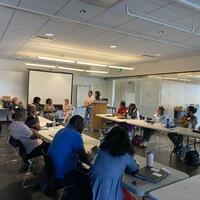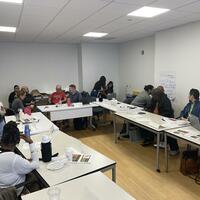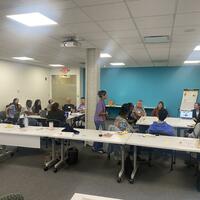Boston EMA Ryan White Planning Council
The Boston Eligible Metropolitan Area (EMA) Ryan White HIV/AIDS Services Planning Council is an independent, volunteer-based, federally-mandated planning body appointed by the Mayor of Boston. The Planning Council integrally works with the Boston Public Health Commission to select and prioritize HIV service categories and allocate Ryan White Part A HIV funding in our region.
The mission of the Planning Council is to improve the quality of the lives of persons with HIV/AIDS by responding to their existing and emerging needs. This is accomplished by supporting and encouraging a range of culturally appropriate health and social services. Moreover, the Council efficiently responds to the changing face of the epidemic with regards to all affected sub-populations and impacted regions within the Boston EMA.
The Boston Eligible Metropolitan Area includes:
- seven counties in Massachusetts (Bristol, Essex, Middlesex, Norfolk, Plymouth, Suffolk, and Worcester), and
- three in New Hampshire (Hillsborough, Rockingham, and Strafford).
History of the Ryan White Program
Who was Ryan White?
Ryan Wayne White (December 6, 1971 – April 8, 1990) was an American teenager from Kokomo, Indiana. He became a national poster child for HIV/AIDS in the United States, when his middle school expelled him due to his infection. Ryan was a hemophiliac and became infected with HIV from a contaminated blood treatment. When diagnosed in December 1984, doctors gave him six months to live. They said he posed no risk to other students. However, AIDS wasn't well understood and when White tried to return to school, many parents and teachers rallied against his attendance. Before White, AIDS was a disease widely associated with the male homosexual community.
A lengthy legal battle with the school system ensued. Media coverage of the case made White into a national celebrity and spokesman for AIDS research and public education. He appeared frequently in the media with celebrities such as Elton John, Michael Jackson, and Phil Donahue. White lived five years longer than predicted and died in April 1990, one month before his high school graduation.
Legislation
The U.S. Congress passed the Ryan White Care Act, shortly after White's death. Ryan White programs are the largest provider of services for people living with HIV/AIDS in the United States.
The act is the United States' largest federally funded program for people living with HIV/AIDS. The act improves availability of care for low-income, uninsured, and under-insured people AIDS victims and their families.
Unlike Medicare or Medicaid, Ryan White programs fund treatment when no other resources are available. As AIDS has spread, the funding of the program has increased. The Ryan White Care Act was reauthorized in 1996, 2000, 2006, and 2009. The program provides some level of care for more than 500,000 people a year. The Ryan White programs fund local and state primary medical care providers, support services, healthcare provider training programs, and provide these organizations with technical assistance.
Ryan White Parts
Part A provides emergency assistance to Eligible Metropolitan Areas (EMA) and Transitional Grant Areas (TGA) severely affected by the HIV/AIDS epidemic.
Part B provides grants to all 50 States, the District of Columbia, Puerto Rico, Guam, the U.S. Virgin Islands, and 5 U.S. Pacific Territories or Associated Jurisdictions.
Part C provides comprehensive primary health care in an outpatient setting for people living with HIV.
Part D provides family-centered care involving outpatient or ambulatory care for women, infants, children, and youth with HIV/AIDS.
Part F provides funds for a variety of programs:
- The Special Projects of National Significance Program grants fund innovative models of care and supports the development of effective delivery systems for HIV care
- The AIDS Education and Training Centers Program supports a network of 11 regional centers and several National centers that conduct targeted, multidisciplinary education, and training programs for health care providers treating people living with HIV/AIDS
- The Dental Programs provide additional funding for oral health care for people with HIV
- The Minority AIDS Initiative provides funding to evaluate and address the disproportionate impact of HIV/AIDS on African Americans and other minorities
About the Planning Council
The Ryan White Treatment Modernization Act allows municipalities to form HIV Health Services Planning Councils. These councils implement services for people living with HIV/AIDS. Council members may include:
- Representatives from health and social service providers
- Public health professionals
- AIDS service organizations
- People living with HIV and their immediate community
The Chief Elected Official of the EMA's largest city appoints the members of the Boston Ryan White Planning Council. The Mayor is the CEO of the EMA’s largest city and grantee for Ryan White Part A funds. Legislation charges the Ryan White Planning Council with the following responsibilities:
- Develop a comprehensive plan for the organization and delivery of HIV-related health services
- Establish service priorities and categorical allocation of Part A funds
- Assess the efficiency of the administrative mechanism in rapidly allocating Part A funds
- Assess the effectiveness of services
- Participate in the development of the Statewide Coordinated Statement of Need (SCSN) and/or Integrated Planning
- Establish methods for obtaining input on community needs and priorities. This may include public meetings, conducting focus groups, and convening ad-hoc panels.
The Council does not directly fund or contract with agencies to provide client services. BPHC's Ryan White Services handles contracting with agencies to acquire services for people living with HIV/AIDS. The Council evaluates how well BPHC performs in contracting services.
The Planning Council conducts various recruitment activities. They recruit new members through mailings, site visits, tabling, and personal conversations. The Council has a Committee that reviews applications and makes recommendations to the Mayor. The Mayor reviews, approves, and makes the official appointments. Appointed members must participate in meetings in order to:
- Examine the HIV epidemic and the current healthcare system in the Boston EMA through a biannual Needs Assessment and Funding Streams Analysis
- Assist in planning for the HIV health care service needs of the Boston EMA
- Determine service priorities for the Boston EMA
- Vote on the types of services funded and the level of funds
Public Planning Council Meetings
Public Meetings
Planning Council Meetings
The general body Planning Council meetings are open to the public. Only appointed Council members can vote on issues raised during the meeting, and the Council follows Robert's Rules of Order.
- 2nd Thursdays of the month, 4 - 6 PM
- In person at the Nonprofit Center, 89 South St., Boston, MA 02111
- Please email PCS at pcs@bphc.org for access to the Zoom link if you'd like to join as a guest remotely.

Consumer Committee Meetings
Consumer Committee Meetings are open to the public and to both people living with HIV and advocates.
- 4th Thursdays of the month, 4 - 6 PM
- In person at the Nonprofit Center, 89 South St., Boston, MA 02111
- Please email PCS at pcs@bphc.org for access to the Zoom link if you'd like to join as a guest remotely.

Committee Meetings
All other Committee meetings are also open to guests except the Executive Committee. They are all via Zoom. Please email PCS at pcs@bphc.org for access to the Zoom link if you'd like to join as a guest remotely. There are some exceptions to the schedule due to holidays or other conflicts, so it is best to always email pcs@bphc.org for confirmation of meeting dates if you are joining as a guest.
- Services, Priorities, and Evaluations Committee (SPEC) - First Thursday of the month, 4 - 6 PM
- Allocation of Resources Committee (ARC) - 3rd Tuesday of the month, 3 - 5 PM
- Needs Assessment Committee (NAC) - 3rd Thursday of the month, 4 - 6 PM
Our Work
Planning Council Committees
Our various committees oversee and implement the prioritization of services and allocation of Ryan White Part A funds.
Join the Planning Council!
Learn the steps of applying to and being nominated for membership on the Boston EMA Ryan White Planning Council.
Planning Council Publications & Reports
Click here to read our various publications and reports that we work on throughout each year.
Anti-Stigma Campaign: Someone You Know and Love
Click here to see our work on the Anti-Stigma Campaign, Someone You Know and Love! Follow us on Instagram @someoneyouknowandlove to stay up to date on campaign activities.
Planning Council Meeting Materials
Click here to view our public meeting materials.
Planning Council Bylaws
The Planning Council reviews our Bylaws, our governing document, annually and ensures that they are up to date, aligned with our goals and requirements and reflect our values. Click here to read our most updated bylaws.



